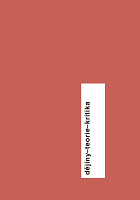K otázkám rétorické a empirické evidence v myšlení raného novověku
On the Rhetorical and Empirical Evidence in Early Modern Thought
Author(s): Lenka ŘezníkováSubject(s): Cultural history, History of ideas, Early Modern Philosophy, 16th Century, Rhetoric
Published by: Univerzita Karlova v Praze - Fakulta humanitních studií
Keywords: rhetorical evidence; Early modern period; J.A. Komenský;
Summary/Abstract: The aim of this essay is to present two related but mutually contradictory cultural-historical interpretations, which explain the notion of evidence in Early Modern thought. While the first emphasises the rhetorical origins of the notion of evidentia and focuses on its rhetorical and narrative aspects, the other claims that due to the introduction of new methods in natural sciences, the notion of evidence in Early Modern Period changes and rhetorical evidence is transformed into an empirical one. This article’s aim is not to map the entire range of scholarship related to the Early Modern understanding of the notion of evidentia: it leaves aside especially those investigations which focus on ‘context- free’ evidence in the sense of ‘self-evidence’. The two abovementioned ways of understanding the notion of evidence are investigated here because they do not treat evidence as an attribute of a judgement or piece of knowledge. Rather, they see it as a historically variable aspect of the act which ascribes a judgement or piece of information the status of evidence. Mutual confrontation of the two interpretations thus also raises a question whether the rhetorical and the empirical aspects of evidence in the context of Early Modern thought are necessarily mutually exclusive.
Journal: Dějiny - Teorie - Kritika
- Issue Year: 2016
- Issue No: 02
- Page Range: 195-210
- Page Count: 16
- Language: Czech

